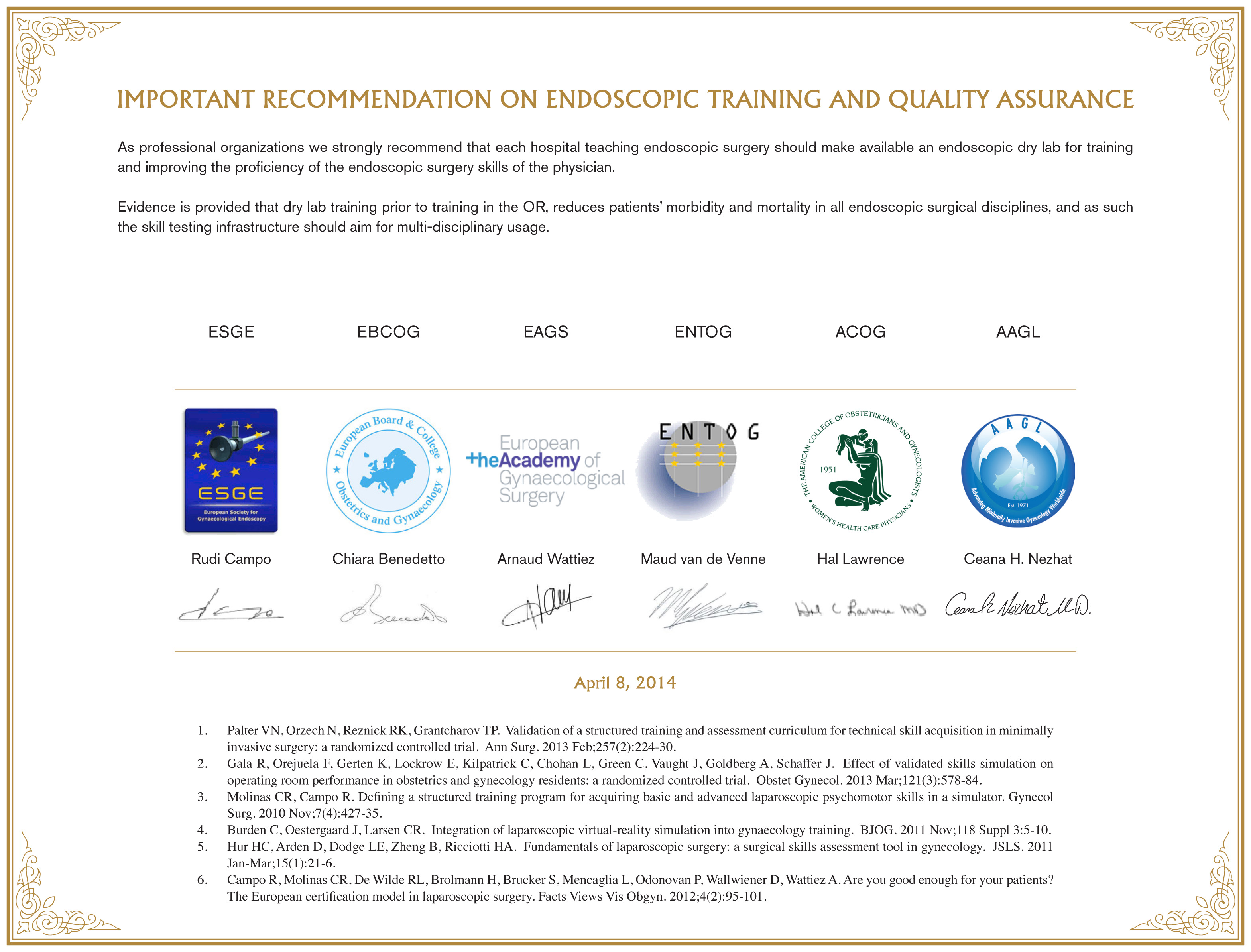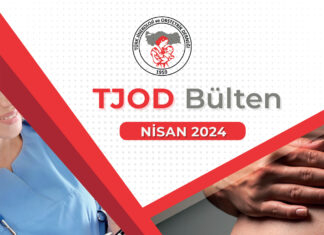PRESS RELEASE
Scientific evidence indicates that dry lab training for endoscopic surgical skills
prior to training in the operating room,
reduces patients’ morbidity and mortality substantially
Six leading professional organizations in Gynaecology
join forces in a global recommendation
regarding endoscopic surgical training and quality assurance
Brussels, June 23. Today, 6 leading European and American professional organizations active in the field of Gynaecological surgery, publish a joint recommendation on the implementation of endoscopic surgery.
Quote
“ As professional organizations we strongly recommend that each hospital teaching endoscopic surgery should make available an endoscopic dry lab for training and improving the proficiency of the endoscopic surgery skills of the physician.
Evidence is provided that dry lab training prior to training in the OR, reduces patients’ morbidity and mortality in all endoscopic surgical disciplines, and as such, the skill testing infrastructure should aim for multi-disciplinary usage.”
Since the early 1990s, laparoscopic surgery has been implemented in nearly all surgical disciplines. On one hand, it offers the possibility to improve the surgical outcome and patient compliance, but on the other hand, it demands the surgical community to train and acquire specific skills. This joint recommendation is a major step in the recognition of the importance of dry lab or simulation-based skill training in teaching hospitals. It supports the philosophy that surgical training programmes should be structured with first the learning and testing of the Instrument handling skills and only when appropriate skills are present can the surgical training programmes in the operating room with an experienced tutor start”, states Dr. Campo, president of the ESGE.
“It is a major breakthrough to improve the quality assurance of minimally invasive surgery and we count on the hospitals to act on the recommendation of the 6 leading organisations behind it, as it will be beneficial for all endoscopic surgical disciplines”, he continues.
“Education and training are among EBCOG’s core activities”, says Prof Chiara Benedetto, Torino, Italy, president of EBCOG. “The apprentice-tutor model was useful for many years, but the complexity of surgical technology in the 21st century requires specific skills, to be taught also outside of the operating theatre. Based on the clinical and scientific evidence we are convinced that every hospital should foresee dry lab training and testing as a means to enhance the quality of patient care. The tools for it exist today, there is no reason to wait”, she stresses.
The Laparoscopic Skills Testing and Training (LASTT) model, developed by The European Academy for Gynaecologial Surgery, for assessing laparoscopic psychomotor skills, proved its face and construct validity in a study published in 2010. “It is a dry lab tool, tutor independent, relatively cheap and suitable for every training box and as such a cost-effective means for continuous dry lab training and evaluation of laparoscopic skills, even in all surgical disciplines”, says Prof Arnaud Wattiez, Strasbourg, France, co-founder of the Academy.
“It is unacceptable that the level of care a patient receives should depend on having the luck to meet a surgeon with appropriate training in laparoscopic surgery”, explains Dr. Maud van de Venne, president of the ENTOG. “As we aim to achieve the highest possible standards of training, we strongly endorse the evidence of dry lab training for acquiring the basic laparoscopic skills like camera navigation, hand – eye coordination, and bi-manual coordination”, she continues.
About ESGE
Since its foundation in 1994, the European Society for Gynaecological Endoscopy (ESGE) has aimed to encourage the exchange of clinical experience, scientific thought and investigation among European gynaecological endoscopists and practitioners in related techniques. Being active in more than 50 countries, counting over 4500 members, the ESGE over the years has achieved global recognition.
Its annual congress is taking place in Brussels from Sept 24 till Sept 27, 2014
About EBCOG
EBCOG is the Board and College of the Obstetrics and Gynaecology Section of the Union Européenne des Medécins Spécialistes (UEMS). EBCOG began in 1996 as a fusion between the European Board of Gynaecology and Obstetrics (EBGO) and the European College of Obstetrics and Gynaecology (ECOG). Based in Brussels, Belgium, EBCOG is an organisation currently made up of 36 countries. The aim of EBCOG is to improve the health of women and their babies by promoting the highest possible standards of care and training in the field of Obstetrics And Gynaecology.
About EAGS
The European Academy for Gynaecological Surgery (+he Academy) offers the gynaecological community scientifically validated standards and criteria for training and education in gynaecological endoscopy and establishes certified training programmes for residents and postgraduates. +he Academy devotes its activities to science, education, training and accreditation in the field of gynaecological surgery and offers an apolitical working platform that uses the best scientific evidence in its decision-making process.
About ENTOG
The objectives of the European Network of Trainees in Obstetrics and Gynaecology is to achieve a better understanding of training in gynaecology-obstetrics in different European countries, thus helping to ensure a comparable standard of training.
The organisation equally aims to achieve the highest possible standards of training and consequently improve the quality of medical care given to women and their babies.
About ACOG
Founded in 1951 in Chicago, The College has over 58,000 members and is the nation’s leading group of professionals providing health care for women. Now based in Washington, DC, it is a private, voluntary, nonprofit membership organization.
The College works primarily in four areas: serving as an advocate for quality health care for women, maintaining the highest standards of clinical practice and continuing education for its members, promoting patient education and understanding of and involvement in medical care and increasing awareness among its members and the public of the changing issues facing women’s health care.
About AAGL
The AAGL vision is to serve women by advancing the safest and most efficacious diagnostic and therapeutic techniques that afford less invasive treatments for gynaecologic conditions through the integration of clinical practice, research, innovation, and dialogue.
Since 1971, the AAGL has worked with some of the world’s finest gynaecologic surgeons to improve the quality of healthcare services for women everywhere.
The AAGL educates by organizing and sponsoring an annual congress and other regional continuing education courses and workshops throughout the United States. The goal of the AAGL is to assist physicians in providing the safest, most therapeutic, and economical surgical care possible for women.












